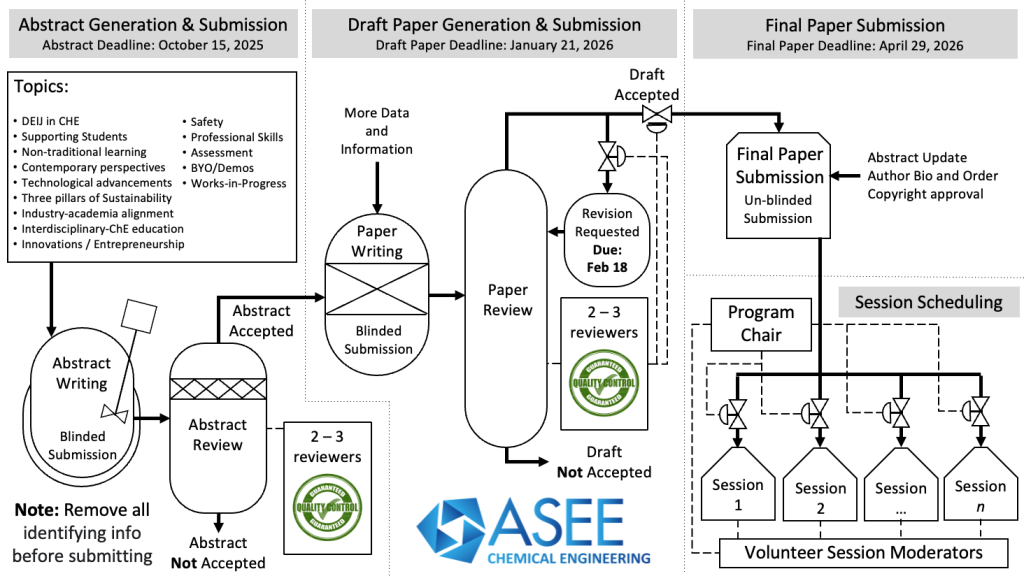Call for Papers
PDF Version of 2026 ChED Call for Paper
The Chemical Engineering Division (ChED) of ASEE invites papers for the 2026 Annual Conference and Exposition in Charlotte, North Carolina (June 21 – 24, 2026). While all topics on Chemical Engineering education will be considered, papers on the following general topics are strongly encouraged:
Topics in ChE Education
- Diversity, Equity, Inclusion and Justice initiatives in ChE programs
- Teaching the three pillars of sustainability: social, environmental, and economic
- Supporting students (e.g. mental health, belonging, advising, etc.)
- Professional skills (e.g. critical thinking, creativity, communication, collaboration, etc.)
- Technological advancements (e.g. AI usage, computer simulations, programming, etc.)
- Incorporating safety and regulatory compliance into ChE curricula
- Entrepreneurship and innovation
- Connecting conceptual silos and interdisciplinary education
- Contemporary perspectives in ChE education
- Assessment and evaluation methods
- Non-traditional learning experiences (e.g. experiential, inquiry-based, immersive, etc.)
- Bring-your-own-experiment/demos (hands-on, online, and virtual)
- Industry – Academia Alignment
- Works-in-progress for discussion or feedback
In addition, suggestions/proposals for panel discussions, workshops, and cross-divisional sessions are welcome. We will consider all ideas submitted for workshop proposals and select the most appropriate to be presented during the Sunday workshop sessions. Abstracts are due October 15th, 2026. For additional deadlines please see the Submission Process section below.
Sessions
In addition to full oral presentations, ChED has the following additional session types:
Work-in-Progress Papers
Papers describing ongoing work (“work-in-progress”) are welcome in all sessions, including the poster session. Please title your WiP Papers in the format of “Work-in-Progress: Title of your project” in addition to indicating it is WiP in the abstract submission portal. This will help us easily identify these submissions. The Works-in-Progress oral sessions will include shorter presentations with time allotted to meet and exchange ideas with session attendees.
Poster Presentations
Poster papers can be in any topic related to chemical engineering education including the list above, including works-in-progress. If you would like to submit a paper to the poster session directly, please clearly designate this request at the end of your abstract. Please note that poster papers will go through ASEE’s double-blind review process.
Moderated Open Mic session
A meeting open to the general audience for free exchange of ideas on current challenges and opportunities in chemical engineering education. Topics are requested from conference attendees.
Resource Lightning Roundtable
This session is designed for those wanting to share a teaching strategy, a technology tool they are using in the classroom, or short research finding. It is an opportunity to discuss ideas in a small group and share resources without the need of a full paper. There will be multiple 10-minute rounds of idea sharing. This abstract submission is run outside of the ASEE NEMO system and will be shared via email to the ChE division in February 2026.
Author Guidelines
Please note that both abstract and draft paper reviews are double-blind, so do not include personal or institutional identification.
Abstracts
Submitted abstracts should be approximately one page or less in length, with a suggestion of 250-500 words. See Appendix B of the Author Kit for details.
Paper Length
Full paper submissions should be approximately 10-20 pages in length, inclusive of figures and other graphical elements; see Appendix B of the Author Kit for details. Please limit Work-in-Progress papers to 3-5 pages (see below).
ASEE Author Kit
Please make sure to follow the abstract and paper submission guidelines available in the 2026 Author’s Kit
IRB Inclusion for Consideration for Best Paper (if applicable)
To ensure ethical considerations and high quality, only papers which discuss IRB (if applicable) will be considered in the evaluation for the Best Paper of the ChE Division (which is then submitted for the Best PIC 1 Paper). IRB inclusion can include (but is not limited to): IRB oversight entity and approval number or a statement of exemption determination.
Submission Flow Sheet

Deadlines
Abstract Submission
- Abstracts open: September 17, 2025
- Abstracts due: October 15, 2025
- Abstract decisions: November 12, 2025
Paper Submission
- Draft papers due: January 21, 2026
- Draft decisions: February 11, 2026
- Revised papers due: February 18, 2026
- Revised papers decisions: March 11, 2026
- Final paper upload deadline: April 29, 2026
As stated above, since reviews are double-blind, please do not include the names of authors or institutions anywhere in the abstract or draft paper. At the end of your abstract, please state if you would particularly like your paper to be in a regular session or a poster session. Abstracts will be reviewed, and if accepted, authors are then invited to complete full papers for further review. In general, the ChE Division is a “publish-to-present” division: to present at the conference, you must have your paper accepted for publication and have at least one author participate in the peer review.
Questions and Comments
For questions regarding paper submission and review, and also suggestions for panels, workshops, or other non-traditional sessions or interdivisional sessions, please contact the 2026 ASEE ChED Program Chair, Eric Husmann, ehusman1@jh.edu.

